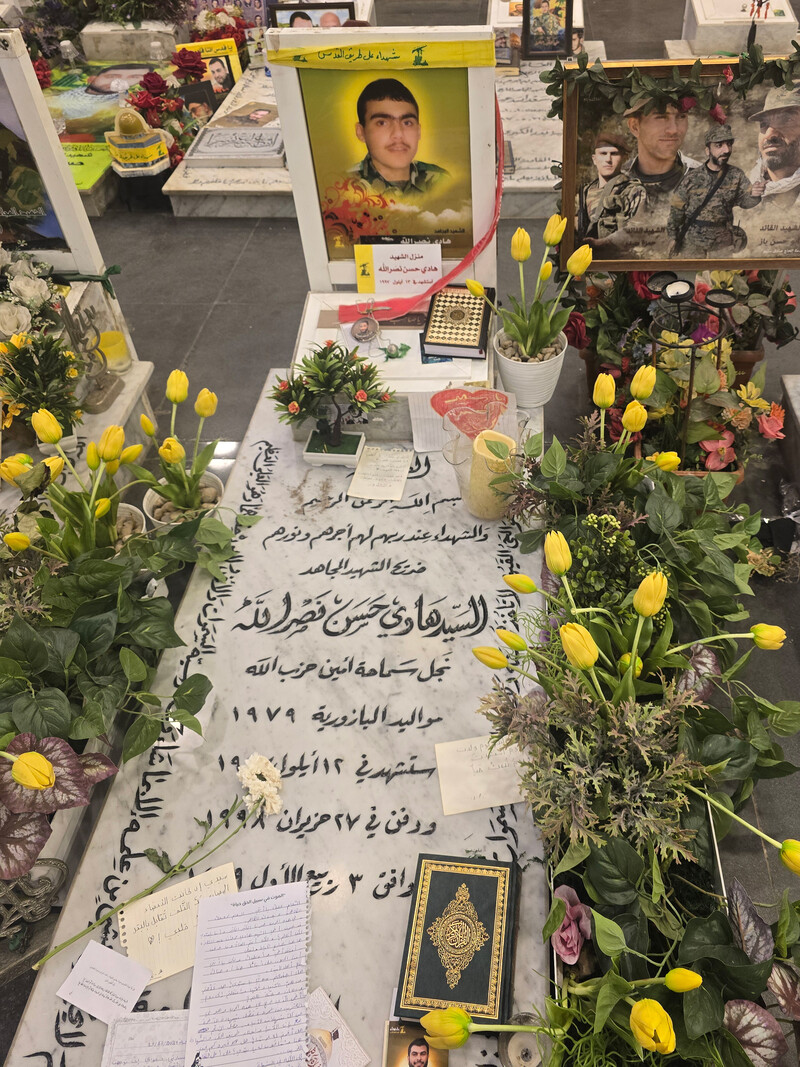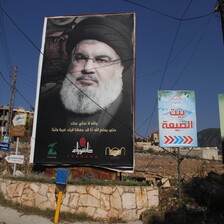The Electronic Intifada 11 January 2025

Mourners attend a memorial for slain Hizballah leader Hasan Nasrallah in the southern suburbs of Beirut on 30 November.
SOPA ImagesIsraeli drones still hum across Dahiyeh, taunting residents of this Beirut suburb.
Enveloped in the ruins of war, the people of Dahiyeh have grown accustomed to the dry whirr of constant surveillance.
The atmosphere since the ceasefire agreement of 27 November has been one of hyper-vigilance, especially as Israel has repeatedly violated the truce.
“This ceasefire won’t hold,” an older resident of Burj al-Barajneh – a Palestinian refugee camp in the Dahiyeh area – tells me.
“The Israelis want to see how far they can push Hizballah until there’s a response. But we will outlast them no matter what they do.”
It is becoming more difficult to argue that the war of attrition has not evolved into another phase, one which may drive the Lebanese resistance into reengaging.
Despite all the destruction, there is a spirit of resilience in Dahiyeh, as well as a devotion to the resistance movement.
The devotion is palpable on a visit to Rawdat al-Shahidain cemetery. Here one finds rows of headstones dedicated to Hizballah fighters, their graves adorned with flowers, letters and ribbons that read “martyrs on the path to Jerusalem.”
Those passing a grave kiss their fingertips before kneeling down and placing their fingers on the headstone’s base.
A young man named Jamal stood near the cemetery’s entrance, prayer beads passing slowly between his fingers.
“People from all over Lebanon come to visit the martyrs each day,” he said. “People from all walks of life.”
A mother sat in front of her son’s grave, gently caressing his photograph. Her son’s greatest achievement, the woman said, was sacrificing himself for the people of Gaza.
“My child could have lived like others, thinking of himself and only himself,” the woman said. “But he decided at a young age that he would rather live according to his principles and he joined the resistance.”
“The entire world watched the people of Gaza suffer on their television screens, but our sons gave their lives for them,” she added. “My son is one of many selfless men and I am proud to be a mother of a martyr.”
“Palestinians have no safety”

The headstone for Hadi Nasrallah, son of the late Hizballah leader Hasan Nasrallah, at Rawdat al-Shahidain cemetery.
The killing of Hizballah leader Sayyid Hasan Nasrallah in September was an emotional turning point for so many people in Dahiyeh.
Nasrallah is affectionately described as “our greatest sacrifice” and a “most precious gift” across the suburb. One can find his image on almost every door and storefront.
“When I think that he died here among us in the suburb, it brings tears to my eyes,” a man from the Hay al-Selloum neighborhood of Dahiyeh said. “In his last speech before his martyrdom, he said that we would emerge with our heads raised, and here we are.”
Because of Israel’s attacks on Lebanon, it was not possible to arrange a funeral procession for Nasrallah after his assassination. The inability to follow traditions has created a kind of surreality for residents of Dahiyeh.
Many struggle to accept that Nasrallah is dead.
“Seeing his face all around me is difficult,” a young woman said. “His leadership redefined not only south Lebanon but all of Lebanon, and now we are entering a new chapter without him. Sometimes I feel lost, but he did not leave us without guidance and without a way forward.”
The enormity of what has been lost overwhelms the senses. Yet the philosophy spelled out by Nasrallah and other leading figures in Hizballah has helped solidify people’s faith and commitment to the Lebanese resistance and the liberation of Palestine.
Back in 2001, Nasrallah delivered a message – during a speech marking Al-Quds Day – to everyone who wanted Hizballah to accept a quiet peace with Israel:
“Today we say to all those who address Hizballah and tell them to leave this battle and you will have safety … You give us safety while the Palestinians have no safety? While the children in Palestine have no safety? Do you give us safety while the persecuted and oppressed have no safety? May God’s curse be upon you and your safety.”
For the people of Dahiyeh, it is inevitable that Israel will fall.
For the people of Dahiyeh, the sacrificing of lives and homes has provided greater understanding that the path to Jerusalem is arduous.
For the people of Dahiyeh, victory is a matter of patience.
Roqayah Chamseddine is an independent Lebanese journalist. She is the co-host of the Delete Your Account Podcast.





